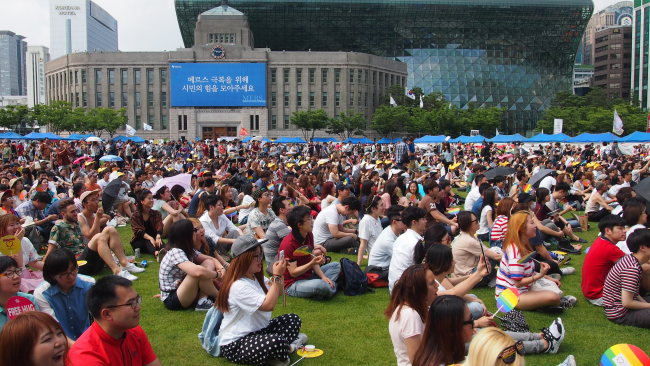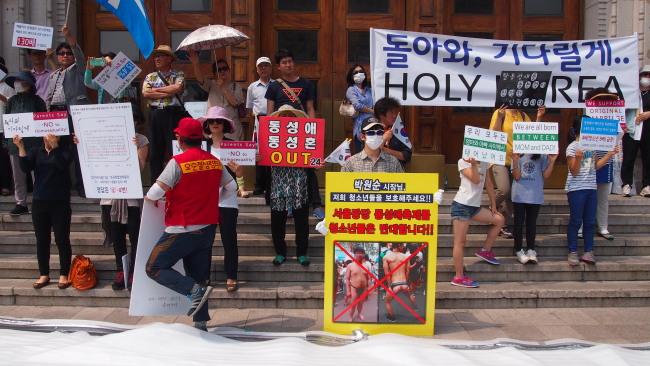While the historic ruling in favor of same-sex marriage swept the U.S. and the world over the weekend, Seoul hosted its own version of a pride parade Sunday, despite vocal opposition from antigay groups.
Seoul Plaza, a traditional rallying point for Korean activists, turned into a rainbow-studded space awash with scores of local lesbian, gay, bisexual, transgender revelers and their supporters, who gathered to march through central Seoul in the evening under the slogan of “Queer Revolution.”
 |
| Hundreds of spectators participate in the closing ceremony of the 16th Korea Queer Festival in Seoul Plaza, central Seoul, to be followed by the pride parade, Sunday. (Ock Hyun-ju/The Korea Herald) |
As the final event of celebration for sexual minorities kicked off at 11:00 a.m., hundreds of sexual minorities and spectators flocked to the Seoul Plaza where nearly 90 gay rights groups, embassies and global companies set up their booths to campaign for equal rights for homosexuals.
The day’s festivities began at around 3:00 p.m. with a performance of a man in a black glitzy costume dancing to Madonna’s signature song “Like a Virgin.” Loud cheers erupted in the sea of people waving rainbow-colored fans.
“We came here today to overcome and cure voices of hatred,” said Kang Myeong-jin, a leader of the festival organization committee in an opening speech. “Please help us to conclude the festival in a good manner.”
 |
| Antigay groups hold placards that read “Holy Korea” and “Homosexuality Out” in Seoul Plaza, central Seoul, Sunday. (Ock Hyun-ju/The Korea Herald) |
Around the corner, hundreds of anti-LGBT campaigners, mostly right-wing and Protestant groups, beefed up their opposition against the event, with some calling for “Jesus,” singing gospels and holding up placards that read “homosexuality is against nature” from the early morning. They also set up a booth to collect signatures for a petition to outlaw homosexuality in Korea.
Tens of police buses were stationed around City Hall, with hundreds of police officers at the scene to prevent possible clashes between the LGBT groups and their opponents.
A high school student Park So-young, who is lesbian, finally made her way to the parade for the first time after hesitating for several years due to her parents’ opposition against her sexuality.
“I hesitated to come here at first, but I feel more confident to show my true self here after seeing many people like me and those who support homosexuals,” said the 18-year-old, who was met with hostility and had to drop out of middle school after coming out at the age of 14.
Park said that she felt sad about the antigay groups, pointing out that there is still a lot of work to be done to raise awareness on sexual minorities in the country.
The big day for the local LGBT community and its advocates were made even bigger with the Friday ruling in the U.S. that legalizes same-sex marriage across the nation.
“The U.S. ruling indicates that countries around the world are slowly becoming more accepting of homosexuality,” she said, echoing hope for a change in Korea, too.
Steve, an Irish national, who only wanted to be identified by his first name, said he came all the way from Chungcheong Province to celebrate Friday’s “monumental” ruling together with others in the gay pride parade.
“The U.S. ruling is monumental because it means that gays are now more accepted in the world. I feel like it is an end of a battle for gay rights,” said the 25-year-old English teacher.
But in Korean society Steve still feels “invisible,” as he still remains a “straight” guy at work out of fear for how Koreans would react to his sexual identity. “I am afraid to come out because there seems to be no regulations that can stop people from despising and discriminating against gays.”
The festival organization committee also tightened security controls for the event by issuing permits to take pictures at the scene only after checking ID cards. It also did not reveal the route for the Sunday parade until the last minute, citing the possibility of antigay protestors blocking its march forward.
The pride parade faced a series of challenges before finally being staged Sunday evening, as antigay organizations attempted to prevent the parade from taking place.
When the 16th Queer Cultural Festival opened on June 9, the festival participants were outnumbered by the antigay activists who staged protests in the event venue, holding signs with slogans like “Stop Same-Sex Marriage” and “Gays Out: Homosexuals have no human rights.”
Christian groups booked out the likely venues for the parade from May. They also camped out in front of Namdaemun Police Station to block the parade organizers from applying for a necessary permit to hold the event in central Seoul.
The police rejected the organizers’ application for the parade in late May, citing traffic disruptions and possible clashes with opponents during the parade.
The Seoul Administrative Court, however, ruled in favor of the LGBT activists, invalidating the police ban on the pride parade, a decision widely welcomed by the gay community and its allies, but condemned by antigay groups.
Organizers said this year‘s pride parade carries greater meaning as it marks the first time the parade has been held in the heart of Seoul since the annual queer festival first took place in 2000 in Daehakro, a street popular among the young.
By Ock Hyun-ju (laeticia.ock@heraldcorp.com)

